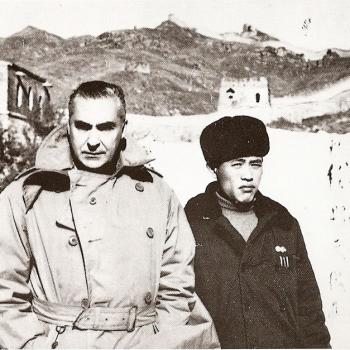In this way, we see the development of Hitler’s Lebensraum; we see the conquest of foreign lands, including those of my own ancestors (Slovakia); we see, at its most extreme, the Holocaust itself. Following the First World War, for example, there was great fear that Germany might go from Reich to Communist polity; the Left had to be defeated. And so during the German Revolution of 1918-19, that country’s center-Left social democrats came together with right-wing militias and other pro-Weimar groups to execute communists. The Weimar Republic, however, would not successfully survive the 1929 stock market crash, which catalyzed the Great Depression and laid bare the inefficacies and inequalities endemic to that system. In 1933, Paul von Hindenburg—a member of the old guard—would hand power over to Hitler, a misstep—though an attempt at the turtling of the body politic—that would lead to the history we all know so well.
This is but one example; it is, however, an instructive one. It lays bare the various ways in which Paxton’s definition corresponds to history. One salient metaphor, used both by fascists and by others about fascism, is that of the “body”—be it the “body politic,” the “corpus” intrinsic to “corporatism,” or the futuristic obsession with perfected individual bodies often found in propaganda. As Paxton has written:
In power, what seems to count is less the faithful application of the party’s initial ideology than the integrating function that espousing one official ideology performs, to the exclusion of any ideas deemed alien or divisive […] Their revolutions consist of hardening the character and purifying and energizing the community, rather than making the social structure or the economic system more just or free […] Fascist ‘revolutionaries’ believe in change in the sense used by Tancredi, scion of the decaying noble Sicilian family in Giuseppe de Lampedusa’s great novel The Leopard: “If we want things to stay as they are, things will have to change.” (“The Five Stages of Fascism,” 7-8)
It should be no surprise, then, that the body is very important to the fascist; society must be hardened through the expulsion of foreign matter; the immune system must kick in to destroy an alien sickness. What matters more than anything is the cleansing and empowering of the body politic. In a sense, fascism is a politics of the body politic; it requires that individual human bodies and the grand corpus of the nation be refashioned.
Lest we think this is only true of the Nazis, Zira Box has written the following of Francoist Spain:
[C]orporealization is a metaphorical mechanism created on the basis of bodily references through which the concept that is metaphorized acquires connotations characteristic of the human body, in two senses: on the one hand, by being defined in terms of bodily characteristics and physical faculties, and on the other, by being given the capacity to provoke physical emotions and feelings, in accordance with these previously established attributes. In the discourse examined here, corporealization is valued negatively, in line with the assumption that the growing complexity of different societies brings with it, as Norbert Elias described, increasing control and domestication of the body. (“The ‘Corporealization’ of the Nation: Notions of the Unclean and Viscosity in the Nationalist Discourse of Spanish Fascism,” 4)
Superficially, we might see a similarity with older discussions of society. We might recall the famous “three estates” of Ancien Régime France, whose proper ordering was thought to be necessary for society’s flourishing. In a specific (and, believe it or not, once famous) 1388 sermon we see how these ideas may themselves be related to the body. Thomas Wimbledon’s St. Paul’s Cross Sermon (which you can listen to here) attacks, in a fairly typical manner, the ways in which society had broken down in the aftermath of the Black Death and the Peasants’ Revolt. Societies, he says, need parts; they are not unlike bodies. These parts must work together: aristocrats must not become too selfish and gluttonous, the poor ought not become avaricious, and clerics ought not do un-clerical things. Prayer, labor, and war-making were all needed—the problem was when the group set to do one thing set about doing another.













